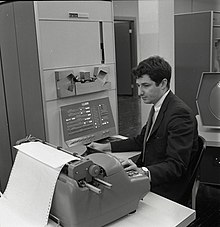Edward Fredkin | |
|---|---|
 Fredkin working on PDP-1, c. 1960 | |
| Born | October 2, 1934 Los Angeles, California, U.S. |
| Died | June 13, 2023 (aged 88) Brookline, Massachusetts, U.S. |
| Alma mater | California Institute of Technology |
| Known for | Fredkin gate Fredkin's paradox Billiard-ball computer Second-order cellular automaton Trie data structure |
| Awards | Dickson Prize in Science 1984 |
| Scientific career | |
| Fields | Computer science, physics, business |
| Institutions | Massachusetts Institute of Technology (MIT) Carnegie Mellon University (CMU) Capital Technologies, Inc. |
Edward Fredkin (October 2, 1934 – June 13, 2023)[1] was an American computer scientist, physicist and businessman who was an early pioneer of digital physics.[2]
Fredkin's primary contributions included work on reversible computing and cellular automata. While Konrad Zuse's book, Calculating Space (1969), mentioned the importance of reversible computation, the Fredkin gate represented the essential breakthrough.[3] In more recent work, he used the term digital philosophy (DP).
During his career, Fredkin was a professor of computer science at the Massachusetts Institute of Technology, a Fairchild Distinguished Scholar at Caltech, a distinguished career professor at Carnegie Mellon University, and a Research Professor of Physics at Boston University.
- ^ Williams, Alex (4 July 2023). "Edward Fredkin, 88, Who Saw the Universe as One Big Computer, Dies - An influential M.I.T. professor and an outside-the-box scientific theorist, he gained fame with unorthodox views as a pioneer in digital physics". The New York Times. Archived from the original on 5 July 2023. Retrieved 6 July 2023.
- ^ See Fredkin's Digital Philosophy web site. Archived 2017-07-29 at the Wayback Machine
- ^ "Information about Edward Fredkin". Archived from the original on 29 October 2013. Retrieved 15 March 2012.